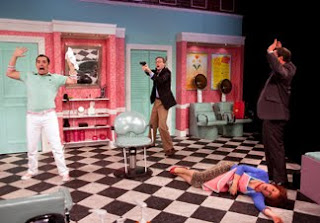The Delaware River near Dingman's Ferry (from my kayak)
In the winter of 2000 the Internet bubble was at its bubbliest. And I had just gotten a job as the Internet guy for Ruder Finn's Capital Market Communications group. Fortunately I didn't know that the storm clouds were gathering even as I merrily deboxed my red Swingline stapler. But by August 2001 the handwriting wasn't just on the wall, it was stamped on my forehead: 'You're fired.' After celebrating a wan 41st birthday on September 10 ... September 11th burned the world down. All in all it was a pretty shitty start to the decade for just about everybody.
Passengers: There's another bubble right behind this one
Even if you hadn't just gotten laid off -- and I had -- the profession of investor relations was not a great place to be (see Sarbanes-Oxley -- it's not pretty). My then wife -- I phrase I'd rather never ever utter again -- put her substantial people skills to work as a real estate broker. She made a bundle. I dusted off my mortgage making skills, and climbed on board. But I didn't make a bundle -- my heart wasn't in it. (I can be pretty lousy at stuff that I don't care about.) And how much money do we need, anyhow? thought I. Ah well. It seems that More was the correct answer. Who knew?
There followed a couple of years where the money seemed to fall out of the sky in great clumps. And, then, in 2007 it slowed to a trickle. 2008? Well, you know. In our world, the money just stopped completely. So we sold the place in the Poconos. And then the place in Washington Heights. And finally the marriage itself just stopped completely.
It's called retirement
I hated being a mortgage broker. I'm lousy at setting up a pipeline and just cranking it out. I love to think about this and that, and to put stuff in improbable piles. I'm really good at that. But somewhere along the way, I just stopped trying. I didn't see the angle.
All I managed to do was to throw paint around my garage in the Poconos, and that almost never pays (Jackson Pollock aside). My therapist said that such behavior didn't make sense for a fifty-year old. Seventy-year old, maybe; fifty-year old, no. It's called retirement, she said.
These are the blue panels that my buddies Don and Chris and I made. (After three years of hanging there they had gotten kinda tired.) On the night we made them, it was zero degrees and felt even colder in my unheated garage. We smoked cigars, and drank wine and bourbon. Then we smeared paint on brown paper, folded it in two, and carefully squished it on these old doors. This may have been my happiest memory of the decade.
This is a picture of Dingman's creek I took during a raging storm. The creek was in full flood mode and had torn this foot bridge from its foundations. I printed the picture out in three by five inch chunks, laminated them, and then connected them with brass grommets by hand. Why? I have no idea.
By measure of effort, this process should have produced the Mona Lisa (it took months) but I actually kinda hated it when it was finished. But it was really fun to do though. I would listen to Garrison Keillor on the crummy old shop radio while I tried to hammer the grommets instead of my thumbs, which I manged to do about 90 percent of time.
We had already agreed to sell -- in order to get a bigger house -- but when the real estate bubble burst we just did the selling part. We knocked some money off the price because we sold it to some friends, and it just made sense. Before we could sell we had to have the septic tank checked. Worried that it would fail the test, I went with the guys who checked it out. This was January of 2009.
Good bye Poconos.








